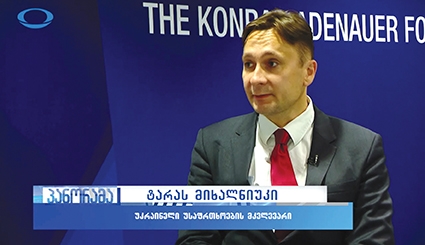Ukrainian Security Expert on his Homeland
Eastern Partnership: Together Towards Tomorrow – was the title of a grand conference that the Konrad Adenauer Foundation’s South Caucasus’ Office hosted last week as part of its School of Excellence Program. Of six Eastern Partnership countries, it is Ukraine whose future is perhaps most uncertain today, so it was the tomorrow of Kyev that we discussed with one of the conference’s main speakers, Taras Mykhalniuk, a security expert and director of the Open Ukraine Foundation.
The Ukrainian president is outspoken about imminent EU and NATO membership. How can that become reality without solving the Eastern Ukraine issue first, not to mention Crimea?
Everybody knows that the conflict prevents Ukraine from becoming a NATO member. But it’s our strategy to secure ourselves in the future because nobody knows how the conflict will develop. NATO membership and the process for NATO integration means a lot for Ukrainian security.
NATO is intent on bolstering Black Sea security and its own presence there
The West is confronting Russia now on their own territory. But there are some questions, namely of hybrid warfare, that the West has yet to understand. For Ukrainians, it’s very easy: we’re at war, we know who the enemy is. For Westerners, it’s not so clear, though they are starting to realize that somebody is trying to damage their critical infrastructure, their political life, and their political systems. Another concern is for the Baltic States and other NATO members because nobody knows what to expect from Russia. Its aggressive foreign policy and attack on Ukraine means that the Baltics are just as at risk. They try to deny it but I believe they still know it’s a danger. The promotion of NATO military forces to the east means that they want to secure the region; that they would rather prevent any experiments from the Russian side.
Tell us about the current process of Ukraine re-discovering its identity. What kind of Ukraine do the Ukrainians want to have?
We’re still building it and it has nothing to do with national identity. Recent polls showed that about 80% of people living in Ukraine consider themselves Ukrainians no matter which language they speak. In eastern Ukraine, everybody understands that it is not about nation or language, it is the fight between a totalitarian and democratic approach. The majority of people have not changed but they know what their purpose is and how they imagine their children will live- and they see a European future for their children. Russia created conflict in the east because it was vulnerable to post-Soviet thinking. If you looked at the Russian discourse online, there were very often statements by pro-Russian forces that they wanted to bring the Soviet Union back. Not because it was highly developed, or with big industries, an IT sector or offered a good lifestyle, but because the whole world was afraid of it. This is a very big problem of the post-totalitarian state: that you do nothing, you can achieve no personal success, you just sit on your sofa and belong to a state the whole world is afraid of. This is a very dangerous psychological thing. What we have in eastern Ukraine is confrontation between civilizations.
Tell us about ex-President of Georgia and ex-governor of Odessa, Mikheil Saakashvili
Saakashvili failed in Odessa. Many Odessa citizens say that a lot was promised but little was done. People were disappointed.
Could this be because his time in that office was so short?
Yes, but if you look at all these processes you don’t find a positive tendency of development. Many people had hopes for him as a foreigner not marred by Ukrainian political life. Unfortunately, it didn’t happen. I don’t know about his current political prospects in Ukrainian political life but Odessa, I believe, was a test that he failed.
Could anybody have succeeded in his place? This is a country where oligarchs have their hands in every pie
I do believe we’re changing, although we don’t have the dramatic changes society would like. Now civil society plays a great role in the country but the problem is that while civil society is taking care of the country’s agenda, they still face bureaucracy which is too lazy to change: it is a strong civil society with weak state institutions. But it is dramatically different compared to Yanukovich’s period, where he aimed to have every power in the country in his hands. Ukraine is too liberal a country. It’s not like Russia, it’s not totalitarian. Ukrainians never wanted the Tsar.
Vazha Tavberidze












